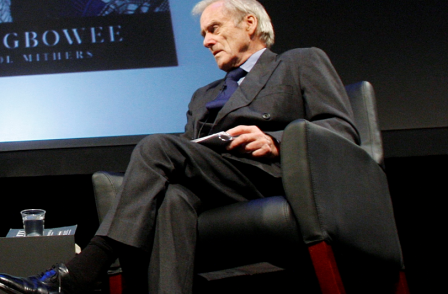
It may be 31 years since Harold Evans left Fleet Street but he is still seen as a huge influence on the current generation of top UK journalists and editors judging by the sentiments expressed at a London dinner held last night in his honour.
Guardian editor Alan Rusbridger, former Times editor James Harding, Financial Times editor Lionel Barber and former Sunday Times columnist turned novelist Jilly Cooper were among those to pay tribute to Evans as he picked up the Media Society’s annual award.
The prize for an outstanding contribution to journalism was largely in recognition of his crusading editorships of the Northern Echo, The Sunday Times (from 1967 to 1981) and finally The Times for a year.
Although Rusbridger entered Fleet Street in 1979 and Evans left it in 1982, the Guardian editor said: “No journalist of my generation could escape Harry’s influence…we were all brought up on his text books. Everything we knew about constructing an intro, subbing, cropping a picture, designing a page or writing a headline we knew it because of Harry. It was drummed into us, at Harlow Tech in my case…He was to journalism what Doctor Spock was to child-rearing.”

Rusbridger revealed that Evans has been a mentor figure to him during his editorship of The Guardian: “I’ve often taken problems to him when I’ve been troubled by a particular story or a legal dilemma, or something about design, or some ethical dispute…I’ll track him down wherever he is in the world and I’ll talk about it…
“He’s been a kind of mentor for me, but more generally for lots of people in the room tonight and for this business we are in he is a kind of mythic figure.
“All professions like to create myths about themselves…not in the sense that they are untrue…but it is a story that we want to tell and believe in ourselves.
“The story that we want to believe about journalism and what great journalism is embodies a collection of these characteristics: these people are brave, they stand up for people when they are most needed, they stand up against authority and bullies, they are not easily intimidated, they write about big things – the things that really matter.
“They hate injustice and when they see it they right wrongs. They never give up on a cause and they have a kind of moral outrage. And that’s Harry…
“He is the sort of journalist that in our hearts we would all like to be. He took on big targets that included Governments, and judges, spies, enormous corporations…they were people with deep pockets, who had a lot of legal and institutional muscle….
“He’s the journalist who reminds us all why we all wanted to be journalists. At a time when some people are giving journalism a bad name he is somebody who gave journalism a good name. He represents what we could be and what we should be.”
Rusbridger drew parallels between The Sunday Times’s celebrated 1967 investigation into British double-agent Kim Philby and The Guardian’s recent stories about the surveillance powers of UK and US intelligence agencies.
He said: “Today it would seem incredible that anyone would try to stop the work of a newspaper investigating a double-agent like that [laughter]…But the government of the day did.
“A minister of state at the foreign office said to reporters you must stop your enquiries there is the most monstrous danger here, you would be helping the enemy…The foreign secretary denounced Harry as a traitor.
“He’s the journalist who reminds us all why we all wanted to be journalists. At a time when some people are giving journalism a bad name he is somebody who gave journalism a good name. He represents what we could be and what we should be.”

BBC head of news James Harding, who like Evans was ousted as Times editor by proprietor Rupert Murdoch, said that his influence was still felt on the paper long after he left it.
He said: “You transformed Fleet Street and you transformed the lives of all of us by understanding and appreciating that investigative journalism defines us. It earns our troublesome place in society and it makes clear for every journalist that what we do, for all our flaws, is invaluable.
“It seems a little odd for us all to be here given Fleet Street’s recent appetite for the circular firing squad. But we are here in this great group hug.
“It’s the most joyous gathering of newspaper people that I can remember. Entirely apt that is you who brought us together because in one form or another we all strive to do what you did in your editorships of the Sunday Times and the Times.”
Email pged@pressgazette.co.uk to point out mistakes, provide story tips or send in a letter for publication on our "Letters Page" blog
